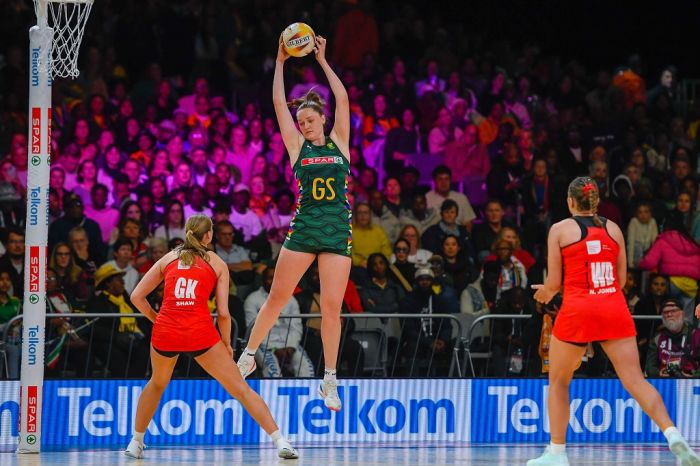The year 2023 is becoming one of the most important for women’s sports in South Africa, writes Telkom chief marketing officer GUGU MTHEMBU.
From witnessing the success of the 2023 ICC Women’s T20 Cricket World Cup, the 2023 Netball World Cup, to Banyana Banyana competing for the first time at the 2023 Fifa Women’s World Cup, there is no denying how women’s sport keeps making remarkable strides to inspire our nation.
While we speak about the strides that our women are making to hoist the South African flag, we are still continually confronted with articles on the chasm of disparity between our sportsmen and women. Disparities continue to raise eyebrows about the state of sport for South African women, despite the recent successes of our national sportswomen.
How do we then enter Women’s Month and celebrate women in sport’s display of hope for a brighter future, without first starting with our strides to enable access to this future for them?
Sport has long been recognised as a powerful vehicle for empowerment, and when it comes to women, the impact is even more profound. However, to truly unlock the potential of women in sport, we need collective efforts from beyond the fields of play into the boardrooms in both the private and public sectors.
This is because, in the world of sport, certain stories often remain unsung, and some heroines are consigned to the pages of history without the support they deserve. For far too long, women’s sport has faced neglect and insufficient support, stifling the growth and potential of talented athletes. But what solutions are there?
Driving positive change
In efforts to drive positive change, the private sector’s involvement in empowering women through sport is a game-changer. Companies have a unique opportunity to leverage their resources, reach and influence to make a tangible difference.
A key example of this is Telkom’s continued championing of the growth and empowerment of women in South Africa through its support of the game of netball in the country. A few highlights here include the key sponsorship of the 2023 Netball World Cup as well as the rise of the Telkom Netball League (TNL) in South Africa.

By investing in women’s sport initiatives, businesses, such as Telkom, demonstrate their commitment to social responsibility, diversity and inclusion.
Such partnerships provide crucial financial backing to women’s sport programmes, ensuring sustainable growth and development. Beyond financial support, through mentorship programmes, female athletes can receive guidance from successful professionals, enabling them to enhance their skills both on and off the field.
Catalysing systemic change
While the private sector plays a crucial role, public sector partnerships are equally essential in empowering women through sport. Government bodies and institutions have a pivotal role to play in gender equality and inclusion in sports.
Today, 29 years into our democracy, boasting a constitution that commits to the promotion of human rights and gender equality for all, how are we a nation that still marvels at stories such as the US women’s national soccer team finally receiving pay parity to their male counterparts?
How are we a nation that reads headlines of the Banyana Banyana squad igniting a fervent and profound standoff against the South African Football Association (Safa), defiantly declining to compete, facing financial struggles and having subpar pitch conditions?
Beyond the constitution and the many sport prescripts committing to alignment with gender reform within and across the country’s sporting landscape, we need public bodies to go beyond written commitments and act on the promise to make women in sport a priority through empowerment, promotion and (financial) support. Such public sector support ensures that women’s sport receives equal opportunities, facilities and recognition and practically paves the way for a more equitable future.
Empowerment beyond the playing field
It is important to note that enabling women in sport offers a unique platform to empower them in multifaceted ways. Participation in sport encourages girls and women to break societal barriers, challenge gender stereotypes and overcome adversity.
Engaging in team sport fosters cooperation, communication and problem-solving abilities, while individual sports promote self-discipline, determination and resilience. These invaluable skills are not only beneficial on the field but also transferable to various aspects of life, including education, career and personal relationships.
Additionally, empowered women in sport become role models, inspiring younger generations to pursue their passions and dreams fearlessly. When women are encouraged to participate, lead and excel in sports, they contribute to breaking the glass ceiling and transforming society’s perception of gender roles.
Therefore, partnerships between the private and public sectors are crucial in unlocking the full potential of women in sport. Together, they can create a more inclusive and supportive environment where female athletes thrive, and women and girls across the world are inspired to pursue their dreams fearlessly.
As we enter Women’s Month, let us recognise the power of partnerships and the collective responsibility we bear in fostering a world where women are empowered, celebrated and given equal opportunities to excel in sports and beyond. Only then can we truly harness the transformative power of sport to create a more equitable and vibrant future for all. Only then can we proclaim ourselves a nation that stands on the shoulders of the women pioneers that have gone before us.
Until then, our women in sport remain scorned.






